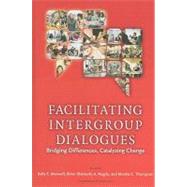
Note: Supplemental materials are not guaranteed with Rental or Used book purchases.
Purchase Benefits
What is included with this book?
| Acknowledgments | p. xi |
| Foreword | p. xv |
| Deepening the Layers of Understanding and Connection | p. 1 |
| A Critical-Dialogic Approach to Facilitating Intergroup Dialogues | |
| In the Hands of Facilitators | p. 23 |
| Student Experiences in Dialogue and Implications for Facilitator Training | p. 23 |
| Intergroup Dialogue Facilitation Training for Classroom-Based Experiences | p. 37 |
| Training Peer Facilitators as Social Justice Educators | p. 41 |
| Integrating Cognitive and Affective Learning | |
| Facilitator Training in Diverse, Progressive Residential Communities | p. 55 |
| Occidental College as a Case Study | |
| Preparing Critically Reflective Intergroup Dialogue Facilitators | p. 71 |
| A Pedagogical Model and Illustrative Example | |
| (Re)Training Ourselves | p. 85 |
| Professionals Who Facilitate Intergroup Dialogue | |
| Intergroup Dialogue Facilitation Training for Applications to Campus and Community Settings | p. 99 |
| Training Students to Change their Own Campus Culture Through Sustained Dialogue | p. 103 |
| Democracy Lab | p. 119 |
| Online Facilitation Training for Dialogic Teaching and Learning | |
| Intergroup Dialogue Facilitation for Youth Empowerment and Community Change | p. 133 |
| Extending Intergroup Dialogue Facilitation to Multicultural Social Work Practice | p. 147 |
| Learning From and with Intergroup Dialogue Facilitators Voices On Identity, Alliances, and Career Commitments | p. 161 |
| Identity Matters | p. 163 |
| Facilitators' Struggles and Empowered Use of Social Identities in Intergroup Dialogue | |
| Not For Others, But with Others for all of us | p. 179 |
| Weaving Relationships, Co-Creating Spaces of Justice | p. 179 |
| Changing Facilitators, Facilitating Change | p. 201 |
| The Lives of Intergroup Dialogue Facilitators Post-College | |
| Contributor Biographies | p. 213 |
| Index | p. 219 |
| Table of Contents provided by Ingram. All Rights Reserved. |
The New copy of this book will include any supplemental materials advertised. Please check the title of the book to determine if it should include any access cards, study guides, lab manuals, CDs, etc.
The Used, Rental and eBook copies of this book are not guaranteed to include any supplemental materials. Typically, only the book itself is included. This is true even if the title states it includes any access cards, study guides, lab manuals, CDs, etc.